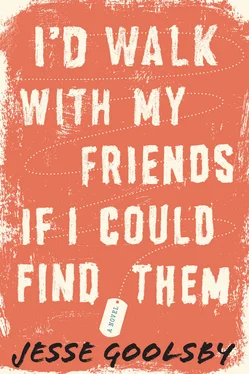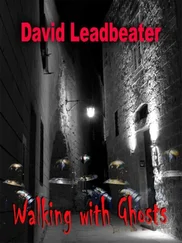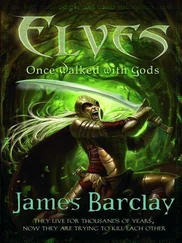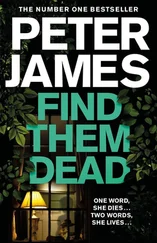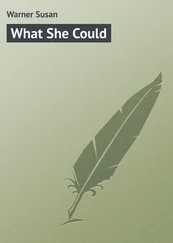Two months after the accident, at the official lineup, he saw her, the woman in Trent Kellogg’s drawing. He knew that there was no such thing as closure or justice, not when you lose your legs and spine to a person driving and texting. He picked her out, said, “That’s her.” In the end his eyewitness testimony was important, but less critical than the woman’s dented LeSabre, previous driving convictions, and eventual confession.
On the way home, Anna drove — has, from the moment of his accident, always driven — and held his hand in the car.
“May she rot in hell for what she did to us,” she said. “Fuck her. They should cut her hands off.” Armando didn’t say anything when the obscenity left her mouth, but the word us haunted him instantly. What she did to me, he thought. What she did to me.
The hotel’s handicapped-accessible room is smoke-free, but Armando smells the dirty cigarette smell in the walls. He sits in his wheelchair, naked, the shower warming up, television tuned to the first presidential debate:
MODERATOR: But if I hear the two of you correctly, neither one of you is suggesting any major changes in what you want to do as president as a result of the financial bailout. Is that what you’re saying?
OBAMA: No. As I said before, Jim, there are going to be things that end up having to be—
MODERATOR: Like what?
OBAMA: —deferred and delayed. Well, look, I want to make sure that we are investing in energy in order to free ourselves from the dependence on foreign oil. That is a big project. That is a multiyear project.
MODERATOR: Not willing to give that up?
OBAMA: Not willing to give up the need to do it, but there may—
Armando turns away. Poor McCain, he thinks. No matter what Obama says, you got no shot.
In the spacious hotel shower Armando turns the temperature way up and lets the steaming water drench him, and he sits on the specially equipped shower seat and touches his wet body. He feels his chest and face and hair. He rubs at his eyes. He pinches the skin at the elbow without nerve endings. He thinks of how his spoiled body retains his healthy name.
He soaps his arm and touches his biceps scar, then reaches down and soaps and rinses his feet, a raised scar on his left foot. He recalls a photo taken two days before that jog. In it he stands in their living room in a bathrobe he hates. He poses for Anna, sticking his belly out in between the crossing flanks of cotton, patting it. After she took the photo Mia screamed from her bedroom, and in his rush to her he cut his foot on the doorstop to her room before calming her down from a nightmare. All of that action he has to create from a photo where he stands frowning at his body. He considers sliding out of the shower, but the hot water keeps coming and he feels like he breaks even with the pricey room when he drains an extra five minutes from a steaming cleanse.
Armando scoots to the edge of the plastic seat and caresses his testicles and fingers the space beneath them, pressing hard. He searches for the twinge that receded after he returned to his room. He tries to convince himself of the miracle in the elevator, that it actually occurred, and he knows that the only proof is to feel it once again. Once is a mirage. Although he has washed himself already, he again soaps his penis, testicles, groin, inside his ass and he dreams up images of the women’s mouths on him.
Once Armando feels lightheaded he turns off the water, but he stays seated while the steam escapes through the slightly open window. He grabs at his narrow quadriceps and pushes down, running his hands to his knees. After he and Anna were married they would routinely make love in the shower, everything slippery and smooth. He’d crouch down to a half squat to enter her, and after, he’d always let her get out first to dry. They’d lie on the bed and he’d silently curse his aching knees and knotted legs before falling asleep. In the long hotel mirror he considers his rehabilitation in the elevator, debates the consequences of sex without his wife, whether there must be morality in miracles.
He dries as best he can and squirts cologne on his neck, buttons up a tailored shirt and squirms into slacks, then finds his fifth of Wild Turkey. He unscrews the top and sniffs the bottle before taking a few biting gulps and hearing talk of war on the television.
OBAMA: And so John likes — John, you like to pretend like the war started in 2007. You talk about the surge. The war started in 2003, and at the time when the war started, you said it was going to be quick and easy. You said we knew where the weapons of mass destruction were. You were wrong. You said that we were going to be greeted as liberators. You were wrong. You said that there was no history of violence between Shia and Sunni. And you were wrong. And so my question is—
MODERATOR: Senator Obama—
OBAMA: —of judgment, of whether or not — of whether or not — if the question is who is best equipped as the next president to make good decisions about how we use our military, how we make sure that we are prepared and ready for the next conflict, then I think we can take a look at our judgment.
MODERATOR: I have got a lot on the plate here…
MCCAIN: I’m afraid Senator Obama doesn’t understand the difference between a tactic and a strategy. But the important — I’d like to tell you, two Fourths of July ago I was in Baghdad. General Petraeus invited Senator Lindsey Graham and me to attend a ceremony where 688 brave young Americans, whose enlistment had expired, were reenlisting to stay and fight for Iraqi freedom and American freedom. I was honored to be there. I was honored to speak to those troops. And you know, afterwards, we spent a lot of time with them. And you know what they said to us? They said, let us win. They said, let us win. We don’t want our kids coming back here. And this strategy, and this general, they are winning. Senator Obama refuses to acknowledge that we are winning in Iraq.
Armando runs his fingers along his jaw, his short, well-kept beard. He mutes the television. Oh, McCain, he thinks. Then, out loud to the television, to a close-up of McCain’s face, mocking, “Let us win, they said. Please John, let us stay here forever and win. We love it here! We’re winners! Fuck you.”
He runs the channels on the muted television: SportsCenter, a Friends rerun, news, Mr. and Mrs. Smith. Brad Pitt and Angelina Jolie trading punches.
Six months ago, a Tuesday night marked the three-year anniversary of the hit-and-run accident, but no one said anything, and Mia threw a fit over dinner in her purple overalls, screaming and pushing. She knocked her chicken enchilada on the floor and told Anna to shut up. At five years old, Mia knew it was spanking time, but she darted away and taunted Armando. He put down his tumbler of whiskey, but he couldn’t catch her in their white kitchen, and he could see the confidence in her young eyes. Catch me, cripple. With a rush Anna snatched Mia’s shoulder and spun her. Armando wanted Anna to bring Mia to him so he could teach her a lesson she wouldn’t forget, but before he knew it Anna wound up and delivered a fist to their daughter’s lower back. This adult-world punch cut the wind from her and she fell to the kitchen tiles. Anna grabbed the bottom of her straps and yank-lifted her up and slapped her temple, picked her up again and slapped her red cheek. Armando saw Mia’s eyes, vacant and disbelieving. Anna said something, but he couldn’t hear the words above Camila’s screeching. Anna looked up at the ceiling and screamed and somehow Mia slipped away and bounded to him, crashed into his chest, shaking and choking him. Anna moved toward them, leaning into the stride with her shoulders, and for the first time in his life Armando feared her and realized there was little he could do, so he lifted his arm in defense, heard himself, in a voice unfamiliar and weak, begging his wife to stop.
Читать дальше
